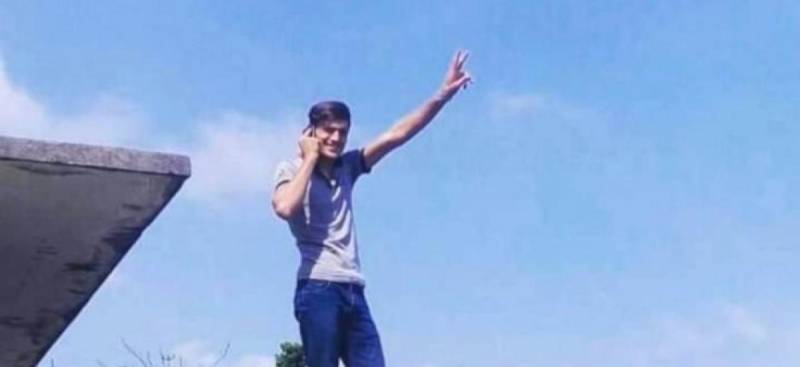Şirin is smiling in this photograph. He is posing like many other Kurdish youth: holding a phone in one hand, and throwing up a peace sign with the other. He is a handsome young man. The photograph seems to have been taken at a construction zone with plenty of greenery in the background. What is most striking about this picture is Şirin’s hopeful smile.
Şirin Tosun was 19 years old. This photograph may have been taken a few months before his death. He was working as a steward for a bus company based in the majority-Kurdish city of Diyarbakır in southeastern Turkey. To help support his family, he travelled with them to northwestern Turkey as a seasonal worker to harvest hazelnuts. One day, the weather was rainy, so he took a break from picking hazelnuts and went into the city with his friends. He and his friend were heading home at night, when a bus with a Diyarbakır license plate drove by them.
The bus stopped and they spoke Kurdish with each other. A group of six people passing by heard them speaking Kurdish, and began to attack Şirin and his friend for speaking Kurdish. After hurling insults and curses, they threw bottles. One of the people in the group fired at Şirin at close range, and Şirin sustained a head injury. After being hospitalised, he remained in intensive care for 50 days before passing away last week. A 19-year-old boy with a beautiful smile, Şirin was murdered for speaking his mother tongue.
Another Kurd, 74-year-old Ekrem Yaşlı, was also attacked for committing the “faux pas” of speaking Kurdish in Turkey last week. He was in the hospital to take care of his 71-year-old wife who was having eye surgery. When another caretaker heard them speaking Kurdish, he exclaimed, “This is the Turkish Republic” and struck the old man in the head with a soda bottle. None of the bystanders reacted to the 22-year-old attacker. Despite the elderly couple’s complaints and the huge gash in Yaşlı’s head, the case was closed because “tangible evidence was not found to support intangible claims.”
The same state that invaded my home with masks and Kalashnikovs because of Tweets I sent calling for peace decided that the gash on Yaşlı’s head was intangible. This is the Turkish Republic, after all!
We Kurds understand well what “This is Turkey” means. In the summer of 1996, I was sitting at the front of a bus travelling from Ankara to Diyarbakır that was attacked and almost set on fire. People from Diyarbakır remember this event well. When our bus crashed, we assumed that people were coming to help the victims, which included people in shock as well as some who had lost their lives. It turns out that the approaching voices we heard were actually coming to throw stones at us, and set us on fire. Having survived the front-end collision, I still remember crying, covered in shards of glass, hearing people I assumed were there to help saying, “Should we burn them?”
With the help of a few members of parliament in Ankara, our bus was taken to a police station, and the military guarded the group of 50 Kurdish people, including children and pregnant women, so we would not be set on fire. We left two days later. The voices of the people that tried to burn us saying, “This is Turkey,” continue to echo in my head until this day.
We hear the mantra “This is Turkey” at sporting events, when we travel to western Turkey for work or vacation, when we drive to southern beaches with our Diyarbakır license plates… we have always heard it.
These days, people are arguing over claims that Turkish novelist Aslı Erdoğan said, “Turks have been taught to hate Kurds.”
People have attacked her from both the right and the left, with the same sentiment of “This is Turkey.” It later became evident that Erdoğan had never made that statement. But the fact that she never said those words does not diminish their truth. It does not diminish the pain that people have been subject to for 100 years due to their differing identities, religions, beliefs, and ethnicities. It doesn’t change the fact that “Armenian” is used as a curse word, that Kurdish deaths are accepted…
I do not know what Turks have felt, or how they have been taught to insult and hate Kurds, and they will have to conduct some reflection and find the answer to this themselves.
But it is not just the Turks that are the problem. We Kurds have also been taught to hate ourselves. We were taught to hate our mothers, our fathers, our own language and culture. We were made to feel that we would only exist if we dedicated our existence to Turkishness. Kurdish children have grown up in this country with anger and pain, but everyone probably looked the other way.
Yes, “This is Turkey.” But do Turks want to continue living this way? Are you happy? Do you want to continue hating your neighbours, colleagues, classmates, hairdressers, doctors, teachers, and repairmen, simply because they refuse to give up their Kurdish identity? Has Şirin’s murder made the country better? Or the assassination of Armenian journalist Hrant Dink in 2007, because he was accused of “insulting Turkishness”? Is this the future you want for your children? Is our children’s fate destined to repeat the past century, where they are either to kill or be killed?
Don’t you realize that you are degrading Turkishness, rather than elevating it? Yes, this is Turkey, and I believe that there can be a Turkey where I don’t have to give up my Kurdishness. But many persistently insist on trying to this belief away from me.
